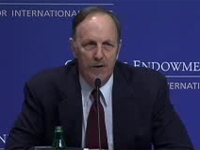Registration
You will receive an email confirming your registration.
China’s economic size will match that of the U.S. by 2035 and double it in total GDP by midcentury, concluded Albert Keidel in presenting his new policy brief, China’s Economic Rise—Fact and Fiction. Keidel and a panel of leading experts on China’s economy and military discussed the success and substantiality of China’s economic rise and addressed the U.S. and global implications of China’s long-term economic growth.
Keidel was joined by Stephen Voth with the U.S. government, Gregory Foster of National Defense University, and Harry Harding of George Washington University. Carnegie’s Michael Swaine moderated the discussion.
According to Keidel, the high likelihood of China’s continued growth for the next few decades is grounded on its own domestic economic strengths. In contrast to what some Western observers believe, China’s economy is largely domestic-driven. While trade is important as part of healthy balanced growth, China’s growth remains independent from export trading patterns and economic fluctuations in the United States. Meanwhile, China has developed a system that rewards and offers strong incentives for increased economic productivity, which is supported by a stable and robust financial system backed by the state. At the same time, unlike other East Asian economies in earlier eras, China has aggressively opened to foreign direct investment and international foreign competition to boost its domestic economy’s efficiency.
Keidel also expressed his confidence in China’s macro-economic management. China’s currency appreciation could be seen as a prudent response to keep between the values of U.S. dollars and the euro, while it has also kept inflation under control, despite necessary concerns as relative prices adjust. The rise in food and energy prices are healthy for rural well-being and energy use efficiency, and China so far has prevented these adjustments from becoming an overall inflationary crisis. Poverty reduction still remains the top priority for Chinese leaders, and inequality may decrease once the percentage of agricultural population goes down. Some of the social unrest is the natural result of the changing economic structures, and gradual political reform is foreseeable in the future.
Regarding the U.S. policy response, Keidel said that the U.S. should learn a lesson from engagement with China in its relations with other autocratic regimes, and rethink its global strategy in light of China’s economic rise.
The panelists provided alternative explanations that accounted for China’s economic growth, and raised concerns on the constraints imposed by the global environmental challenge and energy competition, as well as China’s demographic transitions.
